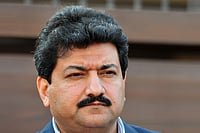I was nervous and apprehensive about interviewing bin Laden. But his candour was both disarming and calming. I was soon asking him questions others would have considered impolite. I asked him whether he could recall the names of all his 25 brothers. He talked about his father, Muhammad bin Laden, who owned a construction company in Saudi Arabia and participated in the renovation of the Medina mosque and the Al-Aqsa mosque in Jerusalem. Wanting to liberate the Al-Aqsa from the Jews, Muhammad bin Laden ordered his engineers to convert the 200 bulldozers the company owned into tanks. The engineers told him it wasn’t possible. His father was disappointed; he had wanted to attack Israel with just 200 tanks. Bin Laden laughed and said: "My father decided to produce sons, as many as he could, to convert them into mujahideen... I have three wives and 16 children. All my sons are ready to sacrifice their lives in the name of God."
This interview was published in the Daily Pakistan, providing a glimpse of the man who wanted to expel American troops from Saudi Arabia and the Jews from Palestine. He argued thus: "Jews and Christians can never become friends of Muslims until we leave our faith, so expel them from Arab lands. This is not what I say, this is what the Quran and the Prophet say. Do you agree with me or not?"
Bin Laden was extremely critical of the US, underlining contradictions in its policies. "The Americans want to implement UN resolutions against Iraq, Libya and Iran but not against Israel. This is because the US is the enemy of Islam." Such answers have won him a huge following in Muslim countries, angry as they are about Washington’s duplicity, though moderate sections don’t share his extremist views.
I again interviewed bin Laden in May 1998, for my Urdu daily Ausaf. This time he explained his differences with the Saudi government. "During the long Iran-Iraq war, I opposed the Saudi government’s support to Iraq. Saudi interior minister Prince Naif was my opponent in the ruling establishment. When Iraq attacked Kuwait, my government asked my help. But I left my country because I was not ready to fight against Iraq with the help of Americans who ditched us in Afghanistan."
A few months later, bin Laden invited me to a press conference at Khost. I declined the invitation saying a large presence of journalists could provide the Americans an inkling about his hideout and a chance to target him. That’s what happened at Khost: the US attacked bin Laden’s camps in Khost with Cruise missiles in August 1998.
My prescience impressed him, as did my refusal to attend the press conference. This was perhaps why he asked me to write his biography. After pondering over the offer, I agreed on the condition that the biography wouldn’t be a verbatim rendition of dictations. I was to have the rights to only the Urdu and English editions and the biography wasn’t to be published in any other language sans his permission. A written agreement was signed between us.
I submitted a long list of questions I wanted him to answer. A few weeks later, bin Laden’s messenger brought me his replies. Initially, Maulana Muhammad Abdullah of Islamabad’s Red Mosque was my contact with bin Laden. But the communication was disrupted after the maulana was killed in October 1998. This was also the time the Taliban imposed restrictions on bin Laden. I didn’t hear from him for months.
About a year later, non-Pakistani colleagues of bin Laden began visiting me and the exchange was consequently renewed. When the biography was about to be completed, Jamait Ulema-e-Islam leader Hafiz Hussain Ahmed told me that bin Laden had given millions of dirhams to Nawaz Sharif in 1989. Sharif was to utilise this money to fund jehad were he to become PM. This allegation imparted a new twist to the project, and I decided to send bin Laden one last questionnaire, asking him about this munificent donation to Sharif and his feelings about the betrayal. I also asked whether he and one Khalid Khwaja had met Sharif in Jeddah’s Green Hotel, and what had transpired between them. I’m yet to receive his answers.
The last I heard from bin Laden was on the night of September 11, when he sent a written message refuting the allegation of his involvement in terrorist actions in the US. Millions of bin Laden’s followers are waiting for Washington to provide credible evidence against him.
Few know that bin Laden is a poet too. His poems are mostly about Palestine. No doubt bin Laden can be eliminated, but his poetry will survive him. This will only fuel the palpable hatred the Muslims harbour against the US.
(The author is the editor of the Pakistani Urdu daily Ausaf.)























